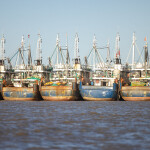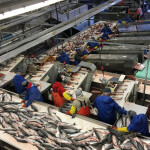Correction: A previous version of this article stated "Smolt production for all ASC-certified salmon farms will not require an on-site audit for the first time in light of the changes..." It has been edited to correctly state that smolt production "for all ASC-certified salmon farms will now require an onsite audit..."
Updates have been made to the Aquaculture Stewardship Council’s (ASC) Salmon and Freshwater Trout Standard, the certifier announced on Thursday, 11 July.
Key revisions aim to resolve inconsistencies between the two standards, the ASC said, with “all freshwater salmonid farming, including salmon smolt production, now [being] audited against the Freshwater Trout Standard, which is specifically designed to minimize freshwater impacts.” Such a change also permits ASC-certified salmon farms to be able to use smolt from freshwater cage culture “if the production has been certified responsible against the stringent requirements of the Freshwater Trout Standard,” the organization explained. Smolt production for all ASC-certified salmon farms will now require an on-site audit for the first time in light of the changes, the ASC said.
Indicators for the ASC Salmon Standard’s chemical treatments, known as the Parasitic Treatment Index (PTI), have also been updated following a detailed analysis of performance data.
“The new requirements on treatments will include a global target that all farms must work towards by meeting specific levels of reductions every year, with initial certification requiring farms meet an evidence-based regional entry level. This level of flexibility further strengthens the standard and incorporate a treatment regime that will lead to further improvements in farm performance,” the ASC said in a press release.
According to the certifier, these latest revisions to its Freshwater Trout Standard have strengthened the requirement, aligning it with up-to-date best practices and having it reflect modern scientific progress. For areas eligible for such certification, the new provisions will reduce the impact of freshwater smolt production, although this does not allow for smolt production in lakes when salmon is not a native species or where it is against the law, according to the ASC.
Additionally, the requirements limit production of smolt in an effort to prevent ASC-certified facilities from exceeding a lake’s carrying capacity. Moreover, requirements on escapes have been fortified in the latest update process, the ASC said, mandating that producers have to now develop genetic baselines and studies of local wild salmon to safeguard the population and to assess future impacts.
“The revision will allow more salmon producers to embrace responsible production by meeting the stringent requirements of the ASC standards, including on-site audits for fresh water smolt production and indicators that will protect the local areas where the smolts are produced by setting production levels that aid conservation, prevent escapes, and protect water quality,” said Chris Ninnes, CEO of the ASC. “The benefits of the ASC program – to the environment, communities, farmers and the industry— and the transparency and accountability that comes with it, are now available to a wider range of farmers.”
After analyzing data on sea lice from government, the Global Salmon Initiative (GSI), and farms engaged in the ASC program, another new requirement has been developed for ASC-certified salmon farms – farms must now meet Weighted Number of Medicinal Treatments (WNMT), a formula that determines both a global level of best performance, as well as a region-specific entry level, based on best performance in that area.
“A farm must meet the regional entry level of WNMT to be certified, but once certified it must then show that it is continuously improving its performance until it hits the global level. A farm’s performance will take into account not only how many treatments it is using, but whether those treatments are targeted,” ASC explained.
“When the ASC Salmon Standard was originally drafted there was very little information on how often salmon were treated to remove sea lice, but since then the ASC program has collected a great deal of performance information from certified farms,” Ninnes added. “Thanks to this data, as well as that from governments around the world and from the Global Salmon Initiative, we have been able to fine tune these requirements so they are more evidence based. The Salmon Standard remains robust, requiring farms to meet best practices in their geographic area, and then if necessary to keep on improving until they meet our global level of best practice. The end result is that more farms are engaged and incentivized to improve their performance and that stakeholders and governments have more information about which farms are actively working to safeguard the environment.”
All the updates were made following a rigorous multi-stakeholder, science-based review process that began back in 2015 with an initial public consultation. Technical working groups with members representing academia, industry, and NGOs carried out the updates, which have each undergone multiple rounds of public consultation before being agreed by ASC’s Technical Advisory Group (TAG) and Supervisory Board (SB), the ASC confirmed.
“I’d like to thank all of those involved in both of these revisions, whose input and feedback ensured that these revisions take into account the varied experiences of our many stakeholders,” said Ninnes. “I’m proud to see the ASC program continuing to refine the multi-stakeholder approach that was foundational to our program and now realizing one of the intentions of the scheme, which was to not only collect performance information from farms but to actively use that information to keep driving further improvements.”
More complete information about the revisions has been released on the ASC’s website, on the pages for both the ASC Fresh Water Trout Standard and the ASC Salmon Standard.







